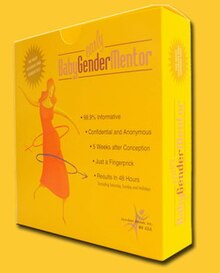This article needs additional citations for verification. (January 2010) |

Baby Gender Mentor is the trade name of a controversial blood test designed for prenatal sex discernment. The test was manufactured by Acu-Gen Biolab, Inc., a biotech company in Lowell, Massachusetts, United States.[1][2][3][4] The test made a media debut on 17 June 2005 on The Today Show[5][6][7] and it was featured in Newsweek in October 2005.[2][8] About 4,500 people had purchased the test by March 2006.[9]
The test claimed that it offered an alternative to amniocentesis and ultrasound.[10] Gender Mentor claimed that women had many motivations for using the test to learn the sex of their fetuses early in pregnancy, including mental preparation and planning gender-specific purchases, or more controversially, sex-selective abortion.[11][12]
Customers and scientists have questioned the accuracy of the test.[13][14][15] Legal actions were taken against Acu-Gen and their supplier. The lawsuits claimed that Acu-Gen's products do not accurately predict the sex of the baby. In their defense, Acu-Gen stated that ultrasound prediction of the sex of a fetus is not always accurate, and told one family their baby had gender abnormalities.[1][9][14][16][17]
Women were instructed to prick their finger to draw a small amount of blood, which was placed on a card to be sent to Acu-Gen to be analyzed for US$250.[16][18] The kit did not require regulation since it did not diagnose, prevent or treat a disease.[19] The company was not obliged to disclose results of tests.[20]
Acu-Gen listed studies related to detecting fetal blood cells present in maternal circulation, but studies did not refer specifically to the Baby Gender Mentor test.[21] The company claimed that their kit could detect twins.[22]
- ^ a b "Moms Sue, Saying Baby Sex Tests Flawed". Associated Press. June 19, 2009. Archived from the original on 19 June 2009. Retrieved June 16, 2009.
- ^ a b "Gender Bender". Pew Charitable Trust. Archived from the original on May 5, 2011. Retrieved July 29, 2009.
- ^ "Step by Step Guide to Baby Gender Mentor Test". BabyGenderMentor.com. Archived from the original on April 10, 2009. Retrieved July 29, 2009.
- ^ "A Total Advantage". Babygendermentor.com. Archived from the original on 2 February 2007. Retrieved January 16, 2007.
- ^ O'Crowley, Peggy (2005). "Parents May Welcome Baby Gender Test, But Bioethicists Worry". Newhouse News Service. Archived from the original on April 27, 2006. Retrieved January 16, 2007.
- ^ "Today Show video segment". PregnancyStore.com. Archived from the original (Flash) on February 3, 2006. Retrieved July 18, 2006.[permanent dead link]
- ^ Goldberg, Carey (June 27, 2005). "Test reveals gender early in pregnancy". The Boston Globe. Archived from the original on 24 February 2007. Retrieved January 16, 2007.
- ^ Cite error: The named reference
Newsweekwas invoked but never defined (see the help page). - ^ a b "Parents sue manufacturer of Baby Gender Mentor". The Taipei Times / The Guardian, Washington. March 16, 2006. Archived from the original on April 21, 2006. Retrieved July 17, 2006.
- ^ Church CC, Miller MW (2007). "Quantification of risk from fetal exposure to diagnostic ultrasound". Prog. Biophys. Mol. Biol. 93 (1–3): 331–53. doi:10.1016/j.pbiomolbio.2006.07.015. PMID 16949653.
- ^ Cite error: The named reference
Fox9was invoked but never defined (see the help page). - ^ Cite error: The named reference
Telegraphwas invoked but never defined (see the help page). - ^ Boyce, Nell (September 29, 2005). "Critics Question Accuracy of Fetus Sex Test". National Public Radio. Archived from the original on July 25, 2024. Retrieved January 16, 2007.
- ^ a b Boyce, Nell (October 10, 2005). "Questions Raised Over Accuracy of Gender Test". National Public Radio. Archived from the original on July 25, 2024. Retrieved January 23, 2007.
- ^ Cite error: The named reference
Wash-Postwas invoked but never defined (see the help page). - ^ a b Jose Martinez (June 16, 2009). "Baby Gender Mentor kit doesn't work, say misled moms suing maker". New York Daily News. Archived from the original on 19 June 2009. Retrieved July 29, 2009.
- ^ Gniady, Jennifer A. (April 1, 2008). "Regulating Direct-to-Consumer Genetic Testing: Protecting the Consumer Without Quashing a Medical Revolution". Fordham Law Review. 76. SSRN 1290303.
- ^ "Prick finger and collect blood". Babygendermentor.com. Archived from the original on 2 February 2007. Retrieved January 16, 2007.
- ^ Boyce, Nell; Inskeep, Steve (February 27, 2006). "Revisiting the Baby Gender Mentor". National Public Radio. Archived from the original on October 11, 2006. Retrieved January 16, 2007.
- ^ Kaiser J (2005). "An earlier look at baby's genes". Science. 309 (5740): 1476–1478. doi:10.1126/science.309.5740.1476. PMID 16141041. S2CID 53886093.
- ^ "Science Behind Baby Gender Mentor Test". Babygendermentor.com. Archived from the original on December 28, 2005. Retrieved May 15, 2017.
- ^ "FAQ—Is The Baby Gender Mentor Test Right For Me?". BabyGenderMentor.com. Archived from the original on 2007-02-02. Retrieved January 22, 2007.